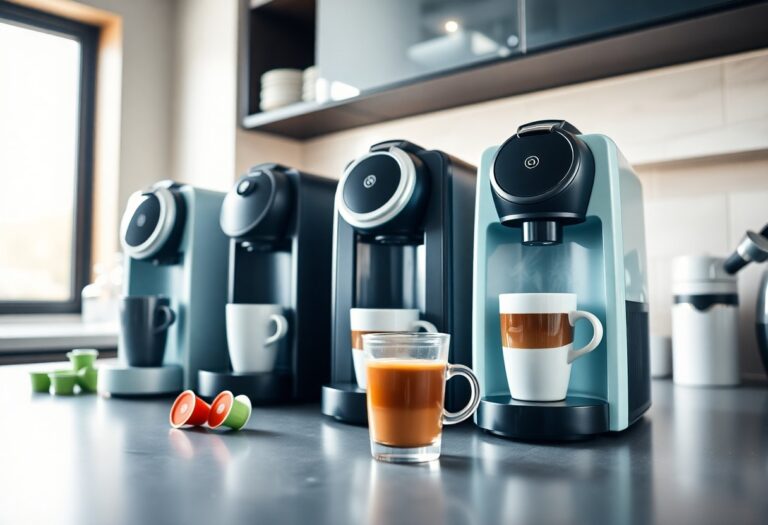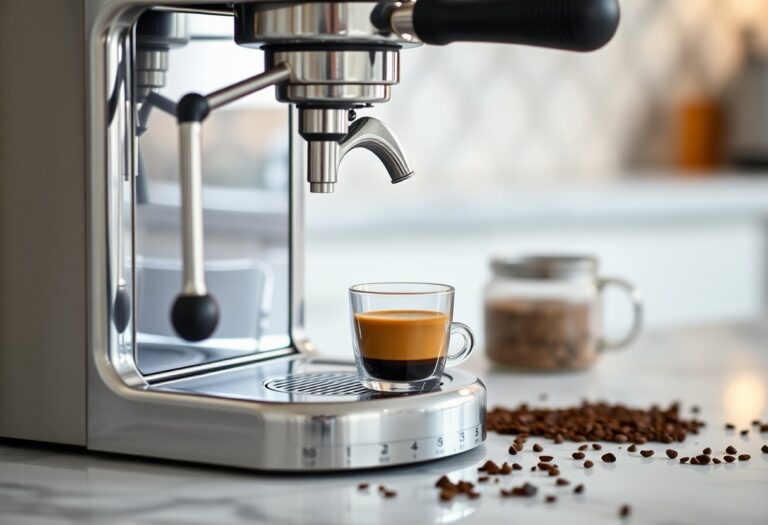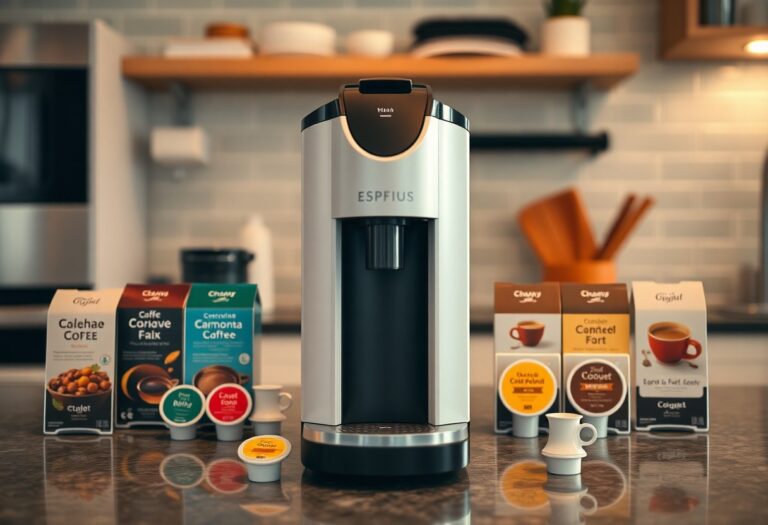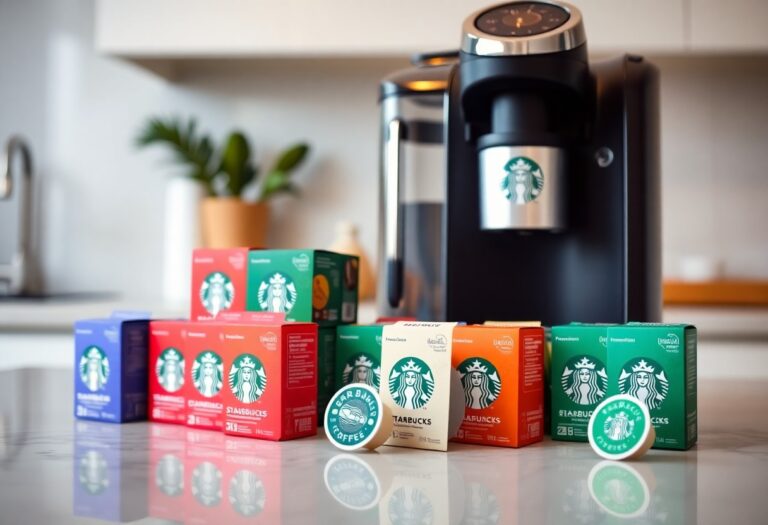What Coffee Beans to Use for a DeLonghi Coffee Machine
You want to make the most of your DeLonghi coffee machine, and selecting the right coffee beans is imperative for achieving a balanced and flavorful cup. Freshness is key; always opt for whole beans roasted within the last two weeks. Your choice of bean type can also impact flavor—arabica beans are generally preferred for their smooth taste, while robusta can add a richer body. Finally, consider grind size; using the right grind will ensure optimal extraction and prevent bitterness. By choosing wisely, you’ll enjoy a superior coffee experience every time.

Key Takeaways:
- Opt for high-quality, freshly roasted coffee beans to enhance flavor and aroma.
- Consider the grind size; medium to fine grinds are generally recommended for optimal extraction in DeLonghi machines.
- Experiment with different coffee bean origins and blends to find your preferred taste profile.
- Check for compatibility; ensure the beans’ oil content is suitable for your specific DeLonghi model to avoid clogs.
- Store beans properly in an airtight container to maintain freshness and quality over time.

Decoding the Coffee Bean Palette for DeLonghi Machines
Selecting the right coffee beans for your DeLonghi machine involves understanding the diverse flavor profiles that can elevate your coffee experience. You might have questions about which beans truly make a difference, and for personalized recommendations, consider checking out this source Q: I am looking for really good tasting coffee beans … that can guide you in your coffee journey.
The Flavor Spectrum: Arabica vs. Robusta
Focusing on the two primary types of coffee beans—Arabica and Robusta—can enhance your brewing strategy. Arabica beans, known for their smooth, nuanced flavors, often exhibit hints of fruit and sugar, making them ideal for those who appreciate a refined cup. Robusta beans, on the other hand, deliver a stronger, bolder taste with higher caffeine content, suitable for espresso lovers. The blend of these beans can yield a balanced cup that incorporates the best of both worlds.
Single-Origin vs. Blends: Which Is Best for Your Brew?
Choosing between single-origin coffee and blends can significantly impact your brewing results. Single-origin beans, sourced from a specific region or farm, bring unique characteristics of their locale, often resulting in distinct flavor profiles that showcase the beans’ terroir. Conversely, blends combine various beans to create a balanced flavor, ideal for those looking for consistency in their cup. Each option presents a different tasting experience, allowing you to tailor your coffee to your palate preferences.
Opting for single-origin coffee means you’re submerging into a story with each cup, highlighting specific growth conditions and processing methods. For example, Ethiopian Yirgacheffe beans often offer bright acidity and floral notes, while Sumatra Mandheling provides earthy undertones and a full body. Blends, however, often play to the strengths of various beans, allowing you to enjoy a rich, well-rounded flavor profile that can cater to different taste preferences. If you appreciate variety, experimenting with both single-origin and blends can keep your coffee experience exciting and dynamic.
The Roast Profiles That Elevate Your Coffee Experience
Exploring the different roast profiles can significantly enhance your coffee journey with a DeLonghi machine. Coffee beans are generally categorized into three primary roast levels—light, medium, and dark—each bringing unique flavors, aromas, and caffeine content. Understanding these profiles helps you select beans that align with your palate and brewing style, ultimately elevating your daily cup of coffee into a personalized experience that excites your senses.
Light, Medium, Dark: Finding Your Preference
Choosing between light, medium, and dark roasts is a matter of personal taste. Light roasts offer vibrant acidity and floral notes, while medium roasts strike a balance with a richer body and caramel undertones. Dark roasts tend to be bold and robust, often featuring deeper flavors of chocolate and a smoky finish. Experimenting with various roast levels will help you identify the profile that best suits your preference and complements your DeLonghi’s capabilities.
How Roast Level Affects Extraction and Flavor
The roast level directly influences extraction and flavor in your coffee. Lighter roasts maintain more of the original bean characteristics, resulting in a brighter taste and complexity. As beans are roasted longer, oils develop and the flavor profile shifts towards bitterness and deeper notes. This transformation impacts not only the taste but also the extraction efficiency in your DeLonghi machine, with different grind sizes and brewing times enhancing specific flavors based on the roast depth.
For example, light roasts typically require a finer grind to extract the nuanced flavors fully. In contrast, dark roasts, with their oily surfaces, might need a coarser grind to avoid over-extraction, which can lead to a bitter cup. Utilizing your DeLonghi machine’s adjustable settings, you can fine-tune the brewing process according to the roast level you choose, ensuring each cup delivers a harmonious balance of flavors. Understanding how roast levels interact with extraction techniques empowers you to maximize your coffee experience and consistently enjoy a well-brewed beverage.
Grind Size: The Unsung Hero of Coffee Quality
The grind size of your coffee is often overlooked, yet it plays a pivotal role in unlocking flavors and aromas during brewing. A DeLonghi coffee machine performs optimally with a specific grind size that matches its brewing method, ensuring every cup delivers the richness and depth you desire. Neglecting this detail can lead to inconsistent brews and less-than-satisfying results, detracting from the overall experience of your coffee ritual.
Understanding the Right Grind for DeLonghi Machines
DeLonghi machines offer flexibility in brewing methods, from espresso to drip coffee. For espresso, a fine grind is crucial, while a medium grind suits drip or pour-over styles. The Barista Touch, for example, thrives with finely ground beans that pack tightly and release rich flavors quickly, highlighting the importance of matching the grind to your specific model for optimal extraction.
How Grind Size Influences Brewing Time and Taste
The size of your coffee grounds significantly affects both brewing time and taste. A very fine grind increases the surface area exposed to water, allowing for faster extraction, which can make your coffee taste bitter if over-extracted. Conversely, a coarser grind extracts more slowly, resulting in a weaker flavor if under-extracted. Ideal brewing times vary: for espresso, aim for 25-30 seconds, while drip coffee benefits from 4-5 minutes, emphasizing the need for a grind size that aligns with your chosen method.
If your grind is too fine while brewing espresso, the water struggles to flow through, leading to over-extraction and a bitter cup. On the other hand, using a coarser grind can cause a weak coffee that lacks crucial oils and flavors. The key lies in finding that perfect balance, which allows the rich nuances of your beans to shine through. Experiment with different grind sizes until you identify the sweet spot that best complements the DeLonghi machine you own and aligns with your taste preferences. Aim for consistency, as even slight variations can lead to noticeable differences in your brew’s taste and quality.
Freshness Matters: The Impact of Roasting Date and Storage
Utilizing coffee beans that are fresh can significantly enhance the flavor profile of your brews with a DeLonghi coffee machine. Beans roasted within the last two to four weeks deliver optimal taste, as the natural oils and gases released during roasting contribute to a rich aroma and full-bodied flavor. Over time, these compounds dissipate, leading to stale coffee that lacks vibrancy. Investing in fresh beans not only elevates your coffee experience but ensures that every cup you brew is an indulgence.
Beyond the Bag: How to Choose Fresh Beans
Look for roasted-on dates printed on the bag, as this indicates when the beans were roasted. Opting for local roasters can also increase the chances of obtaining fresher beans. Purchase only what you can consume within a few weeks to guarantee you’re enjoying your coffee at its peak. Pay attention to blends which may have a longer shelf life, but always prioritize freshness for the best results.
Best Practices for Storing Coffee Beans for Maximum Freshness
Storing your coffee beans correctly is vital to preserving their freshness. Keep beans in an airtight container in a cool, dark place, avoiding exposure to light, moisture, and heat. A specific coffee canister with a CO2 valve is ideal, as it allows gases to escape without letting air in. Additionally, never refrigerate or freeze beans, as the temperature fluctuations can lead to condensation and stale flavors.
Ensuring that your coffee beans remain fresh can markedly improve the taste of your brews. Utilize an airtight container made of opaque material to protect the beans from light and air. Keep this container in a dark, cool area, such as a pantry. It’s best to buy whole beans in amounts you can use within a few weeks, keeping them away from moisture and heat sources like stovetops or sunny windowsills, which can degrade their quality. Adhering to these practices ensures that you always have delightful, flavorful coffee ready for your DeLonghi machine.
Investing in Quality: What to Look for in Premium Beans
Selecting premium coffee beans can transform your DeLonghi coffee experience into something extraordinary. Look for beans with a roasting date close to purchase; this ensures optimal flavor and aroma. Choose single-origin beans for unique profiles or expertly blended beans for a harmonious flavor combination. Packaging should be airtight to prevent exposure to air, while whole beans are preferable to pre-ground coffee, as they preserve flavor longer. For more insights, visit Coffee beans for De’Longhi coffee machine – Café du Jour.
Ethical Sourcing: The Case for Fair Trade and Organic
Opting for Fair Trade and organic coffee beans not only enhances the quality of your brew but also supports sustainable farming practices. Fair Trade certification ensures that farmers receive a fair price and work in decent conditions, which can contribute to better bean quality. Additionally, organic beans are grown without synthetic fertilizers or pesticides, promoting biodiversity and resulting in purer flavors. Investing in socially responsible coffee sources benefits both your palate and the planet.
The Role of Certifications in Bean Selection
Understanding coffee certifications can greatly influence your bean choices. Look for specialty coffee certifications, such as Fair Trade, Rainforest Alliance, or USDA Organic, as they indicate compliance with stringent quality and ethical standards. Specialty-grade beans are often verified by cupping scores at 80 points or higher, showcasing superior taste profiles. Retailers frequently display these certifications, enabling you to make informed purchasing decisions that align with your values.
Certifications often serve as a transparent guideline in the coffee market, assuring consumers that the beans have met strict quality controls and ethical practices. For instance, Fair Trade not only guarantees fair pricing but also enforces community development initiatives in coffee-producing regions. Similarly, Rainforest Alliance certification emphasizes environmental sustainability, which can improve the biodiversity surrounding coffee farms. Emphasizing these certifications empowers you to choose beans that not only taste great but also support responsible and sustainable practices.
Final Words
So, as you explore the best coffee beans to use with your DeLonghi coffee machine, consider your personal taste preferences and the grind type that complements your brewing method. Opt for fresh, high-quality beans, as they will significantly enhance the flavor of your coffee. Whether you prefer a light roast for a vibrant taste or a dark roast for a bold experience, your choice of beans should align with your coffee-making goals. By selecting the right beans, you can maximize the potential of your DeLonghi machine and enjoy a delightful cup of coffee every time.
FAQ
Q: What types of coffee beans work best with a DeLonghi coffee machine?
A: DeLonghi coffee machines are versatile and can handle various coffee beans, including Arabica and Robusta. Arabica beans tend to produce a smoother and more flavorful cup, while Robusta beans can create a stronger, bolder taste with more crema. Depending on your taste preference, you can choose either type or a blend of both for a customized coffee experience.
Q: Should I choose whole beans or pre-ground coffee for my DeLonghi machine?
A: Using whole beans is often recommended as they tend to retain their flavor longer than pre-ground coffee. DeLonghi machines typically feature built-in grinders, allowing you to grind the beans fresh just before brewing. This process enhances the aroma and taste of your coffee. If convenience is a priority, pre-ground coffee is also suitable, but make sure it is specifically ground for espresso or drip brewing to ensure optimal results.
Q: What roast level of coffee beans should I use with my DeLonghi coffee machine?
A: The roast level you choose depends on your personal taste preferences. Light roasts maintain more of the bean’s original flavors, while medium roasts offer a balance of acidity and body. Dark roasts tend to have a richer, bolder flavor, suitable for those who enjoy robust coffee. Experimenting with different roast levels can help you discover your ideal cup.
Q: Can I use flavored coffee beans in my DeLonghi coffee machine?
A: Yes, you can use flavored coffee beans with your DeLonghi coffee machine. However, flavored beans may leave residual oils in the grinder and brew group, which can affect the performance of your machine over time. To maintain your machine, consider using flavored beans occasionally and ensure to clean the components regularly to prevent buildup.
Q: Is there a specific grind size needed for coffee beans in a DeLonghi coffee machine?
A: Yes, the grind size can impact the extraction process and overall taste of your coffee. For DeLonghi espresso machines, a fine grind is typically recommended to ensure a rich and intense flavor. If you’re using a drip coffee maker from DeLonghi, a medium grind is better suited for optimal extraction. Always adjust the grind size according to the brewing method and your taste preferences for the best results.







